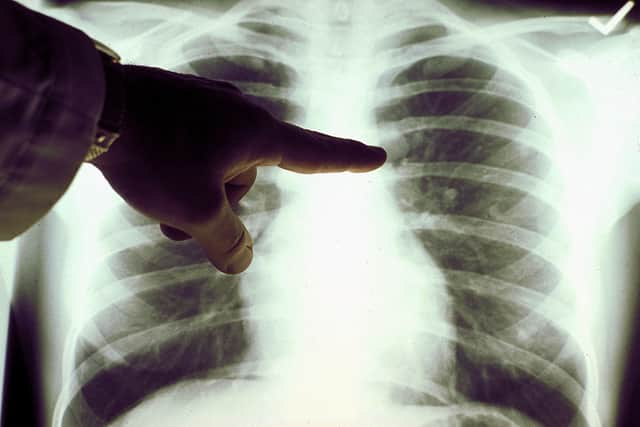Lung cancer symptoms: signs to look out for and its causes - after James Brokenshire MP dies from lung cancer
This article contains affiliate links. We may earn a small commission on items purchased through this article, but that does not affect our editorial judgement.
and live on Freeview channel 276
Former government minister James Brokenshire died on Thursday (7 October) after being diagnosed with lung cancer in 2018.
After his diagnosis, as a non-smoker Brokenshire became vocal in calls for a national screening programme for lung cancer. He said that there was still much stigma surrounding lung cancer, with many wrongly believing that it is only caused by smoking.
Advertisement
Hide AdAdvertisement
Hide AdThis is everything you need to know about lung cancer, from the signs and symptoms to who can be affected by it.
What are the signs and symptoms of lung cancer?
Lung cancer is one of the most common and serious types of cancer, with around 47,000 people diagnosed with the condition in the UK every year.
Generally, lung cancer mainly affects older people - the NHS says “it’s rare in people younger than 40”. More than four out of 10 people diagnosed with lung cancer in the UK are over the age of 75.
The NHS says that there are usually no signs or symptoms in the early stages of lung cancer, but many with the condition will eventually develop symptoms including:
- A persistent cough
- Coughing up blood
- Persistent breathlessness
- Unexplained tiredness and weight loss
- An ache or pain when breathing or coughing


Other less common symptoms of lung cancer include:
- Changes in the appearance of your fingers, such as becoming more curved or their ends becoming larger, which is known as finger clubbing
- Difficulty swallowing or pain when swallowing
- Wheezing
- A hoarse voice
- Swelling of the face or neck
- Persistent chest or shoulder pain
Advertisement
Hide AdAdvertisement
Hide AdThere are two main forms of lung cancer, which are classified by the types of cells in which the cancer starts growing.
These are:
- Non-small-cell lung cancer, which is the most common form, accounting for more than 87% of cases. It can be one of three types: squamous cell carcinoma, adenocarcinoma or large-cell carcinoma
- Small-cell lung cancer, which is a less common form that usually spreads faster that non-small-cell lung cancer
The type of lung cancer a person has determines which treatments they will be recommended.
How is lung cancer diagnosed?
If you have symptoms of lung cancer you should see your GP. Your doctor will ask about your general health and your symptoms and they might examine you.
You may also be asked to breathe into a device called a spirometer, which measures how much air you breathe in and out. You might be asked to have a blood test as well, to rule out other possible causes of your symptoms, such as a chest infection.
Advertisement
Hide AdAdvertisement
Hide AdA chest x-ray is usually the first test used to diagnose lung cancer, as most lung tumours appear on x-rays as a white-grey mass.


However chest X-rays cannot give a definitive diagnosis because they often cannot distinguish between cancer and other conditions, such as a lung abscess.
If a chest x-ray appears to suggest you may have lung cancer, you should be referred to a specialist in chest conditions. A specialist is able to arrange more tests to investigate whether you have lung cancer and, if you do, what type it is and how far it has spread.
Other tests used to confirm a lung cancer diagnosis includes:
- A CT scan
- A PET-CT scan
- Bronchoscopy and biopsy
- Other types of biopsies, like thoracoscopy, mediastinoscopy and percutaneous needle biopsy
Does lung cancer only affect smokers?
Advertisement
Hide AdAdvertisement
Hide AdSmoking is one of the most common causes of lung cancer, and accounts for about 72% of cases.
The NHS says that this is because “smoking involves regularly inhaling a number of different toxic substances”.
While smoking does increase a person’s chances of developing lung cancer, non-smokers can also still be affected.


Cancer charity Macmillian lists the following, aside from smoking, that act as risk factors when it comes to developing lung cancer:
- Passive smoking, which involves breathing in other people’s cigarette smoke
- Age, as lung cancer is more common in older people
- Radon gas, which is a natural gas found in certain parts of the UK which can pass from the soil into the foundations of buildings. Exposure to high levels of radon is not common, but it can increase the risk of developing lung cancer
- Asbestos, which was previously used in building industries. People who have been in prolonged or close contact with asbestos have a higher risk of getting lung cancer
- Having a lower immunity because of illness or treatment can increase the risk of lung cancer
- People with a parent who had lung cancer have an increased risk of developing it
- Recent research has also shown that air pollution can cause lung cancer
How is lung cancer treated?
Advertisement
Hide AdAdvertisement
Hide AdTreatment for lung cancer will depend on the type of mutation the cancer has, how far it has spread and how good a person’s general health is.
If the cancer is diagnosed early and the cancerous cells are confined to a small area, surgery to remove the affected area of lung may be recommended.
If surgery is unsuitable for any reason, radiotherapy to destroy the cancerous cells may be recommended as an alternative.
If the cancer has spread too far for surgery or radiotherapy to be employed, chemotherapy is usually used.
Advertisement
Hide AdAdvertisement
Hide AdThe NHS says that due to the fact that lung cancer symptoms don’t generally present until it’s spread through the lungs or into other parts of the body, “the outlook of the condition is not as good as many other types of cancer”.
“About one in three people with the condition live for at least one year after they’re diagnosed and about one in 20 people live at least 10 years,” the NHS says.
However, survival rates can vary widely, and early diagnosis can make a huge difference.
Who was James Brokenshire?
Brokenshire was a former government minister who passed away at the age of 53 from lung cancer.
Advertisement
Hide AdAdvertisement
Hide AdBrokenshire, the Conservative MP for Old Bexley and Sidcup, had been diagnosed with lung cancer in 2018 and he underwent surgery to remove the upper lobe of his right lung.
He was a non-smoker who had been prompted to visit his GP after coughing up a small amount of blood.
Brokenshire went on to become very vocal over calls for a national screening programme for lung cancer, and in April 2018 used a debate in Parliament to call for a national programme to improve poor survival rates.
He said much stigma surrounds lung cancer, with many people incorrectly believing it is only caused by smoking.


Advertisement
Hide AdAdvertisement
Hide AdAfter news of his death broke, Cabinet Secretary Simon Case said: “On behalf of the Civil Service, I would like to express my deep sadness at the news of James Brokenshire’s death.
“He was a man of deep kindness and integrity, and as a Minister he inspired respect and loyalty from the civil servants who worked for him in the Home Office, Northern Ireland Office and the then Ministry for Housing and Local Government.
“I had the personal privilege of working with him closely over a number of years and admired greatly his unwavering commitment to public service and compassion.
“The thoughts and condolences of colleagues right across the Civil Service are with James’s family and friends.”
Advertisement
Hide AdAdvertisement
Hide AdThe family of the 53-year-old set up a fundraising page to encourage people to share memories, photographs and donate in his memory.
Less than 24 hours after the page was announced on Friday, more than £12,000 had been pledged by the public to the Roy Castle Lung Cancer Foundation.
On the fundraising page, the family said: “Great people leave a huge and lasting legacy. James Brokenshire MP wanted to make a permanent difference to other people’s battles against lung cancer.”
A message from the editor: Thank you for reading. NationalWorld is a new national news brand, produced by a team of journalists, editors, video producers and designers who live and work across the UK. Find out more about who’s who in the team, and our editorial values. We want to start a community among our readers, so please follow us on Facebook, Twitter and Instagram, and keep the conversation going. You can also sign up to our newsletters and get a curated selection of our best reads to your inbox every day.
Comment Guidelines
National World encourages reader discussion on our stories. User feedback, insights and back-and-forth exchanges add a rich layer of context to reporting. Please review our Community Guidelines before commenting.
